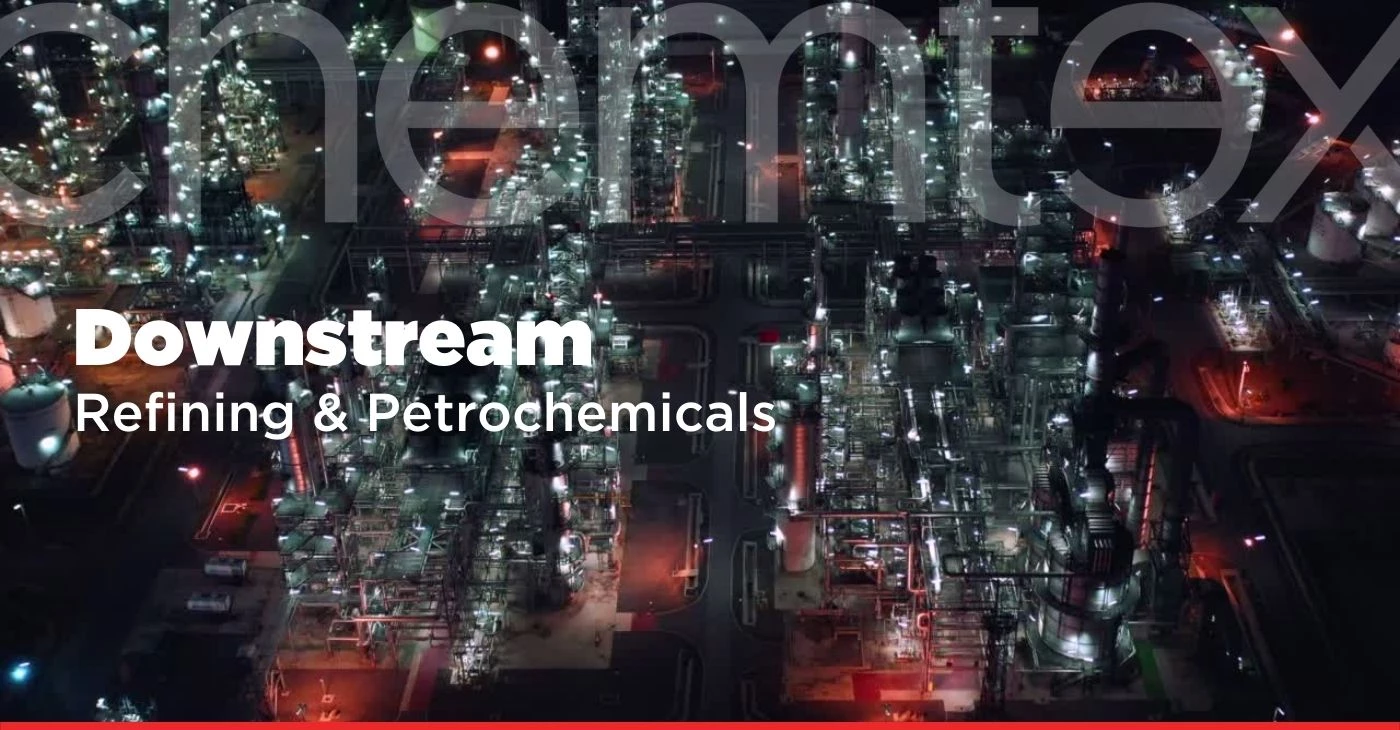Refining, processing, & purifying crude oil and natural gas
The final stage of the petrochemical industry is downstream, dedicated to refining, processing and purifying natural gas and oil into marketable petroleum products. Downstream chemicals find most use in refining operational units such as in distillation units, coker units, overhead lines & exchangers, pre-exchanger units, regenerator & recovery units. Downstream / Refinery units are prone to deposits of hydrocarbons, fouling agents, organic & inorganic residues, adverse foaming, that devises a negative impact on efficiency and productivity.
Two core process involved in a downstream process are crude refining and transfer of refined oil and gas to respective stations and storage. Some of the refined products includes LNG, Gasoline, Heating Fluid, Combustion Fuel, Synthetic Rubber, Lubricants, Antifreeze, Fertilizers, and others, most of them being directly linked to end use consumers. Chemtex manufactured downstream chemicals are completely organic, biodegradable and adds to performance of each unit which in turn increases the productivity of refined oil and gas.

Components & Range of Downstream Chemicals
Downstream Primary Units
Neutralizing amines are a common steam line treatment that can be fed in a water treatment solution along with other treatment chemicals
Corrosion inhibitors are chemicals that are added to a chemical stream to prevent corrosion, or lower the rate of corrosion so
Defoaming chemicals are specialty formulation which shows excellent performance in the control of foams and improves the flow
Downstream Secondary Units
Specifically formulated Crude Antifoulant Additive, removing all organic and inorganic contaminants effectively from process equipment surfaces...
Corrosion inhibitors are chemicals that are added to a chemical stream to prevent corrosion, or lower the rate of corrosion so
Fuel Performance Enhancers
For use in diesel, bio-diesel, gasoline and other fuels that prevents wax precipitation on feed circuit stream lines, and brings down cold filter plugging point. It helps in maintaining constant fuel flow rate through channels and pipelines. Neither does it inherent harmful by-products nor does it change any property of the diesel on injection, manifesting excellent viability with other diesel additives.
Engines rely on fuel to lubricate moving parts of fuel injection equipment. Low fuel lubricity can lead to fuel pump wear and engine failure. To meet the lubricity requirements of fuel specifications, lubricity improvers are injected that provides optimum boundary lubrication for a broad range of fuels, boosting or upgrading the lubricity of diesel / fuel.
Alkyl amines and modified polyols based dehazer additive, for use in diesel, gasoline and other heating fuels. It removes haze / entrained water, improving fuel quality and preventing corrosion in engine tank internals during use. The formulation also inhibits water emulsions induced bacterial and fungal contaminations throughout fuel distribution system.
Also known as Fuel Conductivity Improver
Polyamine – Polysulfone based chemical formulation, for use in aviation / jet fuels, diesel, and distillate fuels to increase their conductivity. It prevents formation of static charges within, reducing uneven friction in the pipelines during transportation and electrostatic charging of fuels.
Fuel Treatment Additives
Based on organic catalyst technology, improves combustion, lowers combustion point, ensures that fuel burns for a considerable period of time even at lower temperature.
Polymeric additive, forbids growth of crystals as well as inhibits wax consolidation, ensuring normal flow of refined petroleum at cold temperature.
Aqueous dispersing agents formulated to control deposition of wax or paraffin in fuel injector tanks, increasing production output and reducing frequency of work-over operations.
Specifically formulated additive for use in end use fuels, when added in MS blend, enhances their attributes, during their use in engine. The additive reduces internal engine carbon buildups, controls automobile exhaust smoke, adds anti-wear properties and contributing to fuel economy
